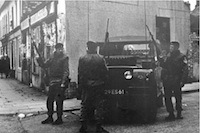
Families of eleven people killed by the British army in Ballymurphy nearly 40 years ago have revealed that they have been contacted by one of the British soldiers involved in the shootings.
On Monday August 9 1971 mem bers of Parachute Regiment were drafted into Ballymurphy during the launch of internment.
Over the next three days 11 unarmed people - including Catholic priest Fr Hugh Mullan and mother-of-eight Joan Connolly - were shot dead by the unit.
No-one has ever been charged with the killings.
The victims’ families have cam paigned for a public inquiry into the fatal shootings.
Earlier this summer the Catholic Church called on the British government to publicly apologise for the killings.
It has now emerged that a soldier, apparently involved in the shootings, has made contact with a Ballymurphy families support group.
Briege Voyle, whose mother Joan was shot dead by soldiers while searching for her sons, said that a telephone discussion had taken place with one of the soldiers present during the killings.
“He telephoned our office and gave enough detail to prove that he was indeed in Ballymurphy during the killings and witnessed what happened,”she said.
“He admitted there had been a lot of talk recently between the sol diers who were there in BalIymurphy and that the truth needed to be told.
“We may not agree with every thing that he claims happened but we are appealing for him to get back in contact so that we can talk.”
SUNDAY STATEMENT CRITICISED
Meanwhile, Sinn Fein has voiced criticism of the statement made by British Prime Minister David Cameron in response to the Bloody Sunday report.
“It was a significant statement, not least because he is a Tory Prime Minister,” said Sinn Fein’s Caoimhghin O Caolain, speaking to the Good Friday Agreement Implementation Committee.
“But there is also much in it about the role of the British government and the British armed forces in Ireland which we strongly contest.
“We have never accepted and, I believe, the majority of the Irish people have never accepted that the role of the British armed forces in the Six Counties was in David Cameron’s words, ‘upholding democracy and the rule of law’.
“We need to consider carefully what David Cameron said about the role of the British government and senior British commanders regarding Bloody Sunday. The Prime Minister claimed that those looking for a conspiracy involving senior politicians or senior members of the armed forces would not find it in the Saville Report. But David Cameron also said: ‘The Government is ultimately responsible for the conduct of the armed forces’.
“The gap in the Saville Report is its silence on the responsibility for the killings at the highest military and political level, both in terms of so-called security policy and deployment of the Paras themselves.”
![[Irish Republican News]](https://republican-news.org/graphics/title_gifs/rn.gif)
![[Irish Republican News]](https://republican-news.org/graphics/title_gifs/harp.gif)

